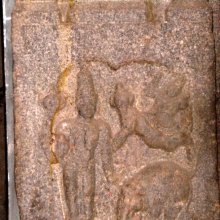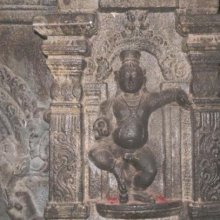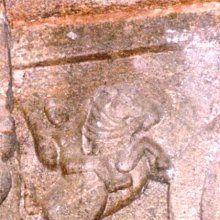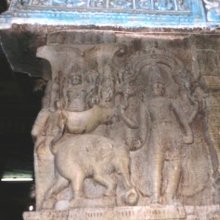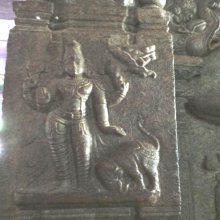Gajendra, Gaja-indra: 13 definitions
Introduction:
Gajendra means something in Hinduism, Sanskrit. If you want to know the exact meaning, history, etymology or English translation of this term then check out the descriptions on this page. Add your comment or reference to a book if you want to contribute to this summary article.
Images (photo gallery)
(+2 more images available)
In Hinduism
Vaishnavism (Vaishava dharma)
Source: ISKCON Press: GlossaryGajendra (गजेन्द्र).—The king of the elephants. He was saved from a crocodile by Lord Viṣṇu and awarded liberation.

Vaishnava (वैष्णव, vaiṣṇava) or vaishnavism (vaiṣṇavism) represents a tradition of Hinduism worshipping Vishnu as the supreme Lord. Similar to the Shaktism and Shaivism traditions, Vaishnavism also developed as an individual movement, famous for its exposition of the dashavatara (‘ten avatars of Vishnu’).
Purana and Itihasa (epic history)
Source: archive.org: Shiva Purana - English TranslationGajendra (गजेन्द्र) refers to a “lordly elephant” (given by Indra), according to the Śivapurāṇa 2.4.5 (“Kārttikeya is crowned”).—Accordingly, after the Kṛttikās spoke to Kārttikeya: “[...] Then Śiva, the lord of the universe, following the worldly convention delightedly placed Kārttikeya on a beautiful gemset throne. [...] Then Indra gave him a lordly elephant (gajendra) and a thunderbolt. The lord of the waters, Varuṇa, gave him a white umbrella and a necklace of gems to wear. The sun gave him a chariot as fast as the mind and a coat of mail with great equipments; Yama his own staff: the moon a vessel full of nectar. [...]”.
Source: Cologne Digital Sanskrit Dictionaries: The Purana Index1a) Gajendra (गजेन्द्र).—The legend of Viṣṇu freeing the elephant in trouble. While wandering in the hills, this lord of elephants felt thirsty and entered a lake in the Trikūṭa hill. While drinking water, a crocodile caught hold of its feet. Finding himself on the brink of death, Gajendra bestowed his thought on Hari on account of the vāsana of the previous birth. Pleased with his prayer, Hari flew on Garuḍa with his cakra and released the animal from the crocodile. The elephant attained a form like that of Hari. This elephant was in his previous birth a Pāṇḍyan king by name Indradyumna devoted to Hari but cursed by Agastya to be born as elephant.1 Hari blessed Gajendra who got mokṣa by satsaṅga.2 Hence Gajendramokṣa.3
- 1) Bhāgavata-purāṇa III. 19. 35: VIII. 1. 30: 2. 20-33: 3 (whole): 4. 6-25.
- 2) ibid. X. 71. 9: XI. 12. 6.
- 3) ibid. II. 7. 15-16.
1b) The Airāvata which came out of the churning of the ocean of milk. It was taken up by Indra.*
- * Matsya-purāṇa 251. 3.

The Purana (पुराण, purāṇas) refers to Sanskrit literature preserving ancient India’s vast cultural history, including historical legends, religious ceremonies, various arts and sciences. The eighteen mahapuranas total over 400,000 shlokas (metrical couplets) and date to at least several centuries BCE.
Shaktism (Shakta philosophy)
Source: Google Books: ManthanabhairavatantramGajendra (गजेन्द्र) refers to the “Lord of the Elephants”, according to the Manthānabhairavatantra, a vast sprawling work that belongs to a corpus of Tantric texts concerned with the worship of the goddess Kubjikā.—Accordingly, “[...] The Seat of Gesture is the Lord of the Elephants (i.e. KHPHREṂ) [i.e., gajendra], the pure Cave of the Moon that has fashioned itself in Kāmarūpa. Above is the seat Trisrota that generates the bliss of the teaching. It is the half-measure of the Seed of Sound (HSAUṂ). The seat of Meru is in the Point. It is power, the seed of bliss (AIṂ), which is the mouth of the Lotus of Kula. There is the Divine Current divine, that of the seats and above that the entire Current of the Siddhas and the Current of Kula. The Current of the Teachers is in Candrapurī, and the authority is in Koṅkaṇa at the beginning of the Age of Strife. It is this Tradition that is present in the three lineages. I bow constantly to (this) maṇḍala made of six parts)”.

Shakta (शाक्त, śākta) or Shaktism (śāktism) represents a tradition of Hinduism where the Goddess (Devi) is revered and worshipped. Shakta literature includes a range of scriptures, including various Agamas and Tantras, although its roots may be traced back to the Vedas.
Shaivism (Shaiva philosophy)
Source: Google Books: Manthanabhairavatantram (shaivism)Gajendra (गजेन्द्र) refers to one of the twelve disciples of Matsyendranātha, according to Abhinava in his Tantrāloka verse 29.25-43.—Matsyendranātha and his consort had twelve disciples. Out of these twelve ‘princes’ (rājaputra), six were ‘celibate’, that is, they did not have spiritual offspring. The other six founded the six lineages (ovalli also called kulas) mentioned above. They are worshipped along with Matsyendranātha and his consort in the Wheel of the Siddhas at the beginning of the Kaula ritual described by Abhinava in his Tantrāloka. These six—[e.g., Gajendra]—are celibate and so do not possess authority, as authority is the expansion of vitality along the path of Kula.

Shaiva (शैव, śaiva) or Shaivism (śaivism) represents a tradition of Hinduism worshiping Shiva as the supreme being. Closely related to Shaktism, Shaiva literature includes a range of scriptures, including Tantras, while the root of this tradition may be traced back to the ancient Vedas.
Languages of India and abroad
Sanskrit dictionary
Source: DDSA: The practical Sanskrit-English dictionaryGajendra (गजेन्द्र).—
1) an excellent elephant, a lordly elephant; किं रुष्टासि गजेन्द्रमन्दगमने (kiṃ ruṣṭāsi gajendramandagamane) Ś. Til.7; ऐरावतं गजेन्द्राणां (airāvataṃ gajendrāṇāṃ) Bhagavadgītā (Bombay) 1.27.
2) Airāvata, Indra's elephant.
3) Name of a tree; गजेन्द्र- कुसुमाकीर्णम् (gajendra- kusumākīrṇam) Mahābhārata (Bombay) 13.132.12. °कर्णः (karṇaḥ) an epithet of Śiva.
Derivable forms: gajendraḥ (गजेन्द्रः).
Gajendra is a Sanskrit compound consisting of the terms gaja and indra (इन्द्र).
Source: Cologne Digital Sanskrit Dictionaries: Shabda-Sagara Sanskrit-English DictionaryGajendra (गजेन्द्र).—m.
(-ndraḥ) 1. A large and excellent elephant. 2. Indra'S elephant E. gaja, and indra chief.
Source: Cologne Digital Sanskrit Dictionaries: Cappeller Sanskrit-English DictionaryGajendra (गजेन्द्र).—[masculine] a noble elephant (lit. chief of the elephants).
Source: Cologne Digital Sanskrit Dictionaries: Monier-Williams Sanskrit-English DictionaryGajendra (गजेन्द्र):—[from gaja > gaj] m. = ja-rāja, [Mahābhārata i; Nalopākhyāna xii, 40]
Source: Cologne Digital Sanskrit Dictionaries: Yates Sanskrit-English DictionaryGajendra (गजेन्द्र):—[gaje+ndra] (ndraḥ) 1. m. Indra's elephant.
Source: DDSA: Paia-sadda-mahannavo; a comprehensive Prakrit Hindi dictionary (S)Gajendra (गजेन्द्र) in the Sanskrit language is related to the Prakrit words: Gaiṃda, Gayaṃda.
[Sanskrit to German]
Sanskrit, also spelled संस्कृतम् (saṃskṛtam), is an ancient language of India commonly seen as the grandmother of the Indo-European language family (even English!). Closely allied with Prakrit and Pali, Sanskrit is more exhaustive in both grammar and terms and has the most extensive collection of literature in the world, greatly surpassing its sister-languages Greek and Latin.
See also (Relevant definitions)
Starts with: Gajendracarma, Gajendracharma, Gajendrakarna, Gajendramoksha, Gajendramoksham, Gajendramokshana, Gajendramokshanastotra, Gajendranatha, Gajendrapada, Gajendrasya, Gajendravikrama.
Ends with: Agajemdra.
Full-text (+12): Gajendramokshana, Gajendranatha, Kacentiran, Gajendrakarna, Gajendravikrama, Gayamda, Gaimda, Lohajala, Aparayat, Kavittalam, Huhu, Panagadi, Urdhvaretas, Manidatta, Rajaputra, Attapuyakkaram, Satyadhara, Siladhara, Shrutadhara, Manorama.
Relevant text
Search found 36 books and stories containing Gajendra, Gaja-indra; (plurals include: Gajendras, indras). You can also click to the full overview containing English textual excerpts. Below are direct links for the most relevant articles:
Sahitya-kaumudi by Baladeva Vidyabhushana (by Gaurapada Dāsa)
Text 7.89 < [Chapter 7 - Literary Faults]
Garga Samhita (English) (by Danavir Goswami)
Verse 6.10.13 < [Chapter 10 - In the Description of the Gomatī River, the Glories of Cakra-tīrtha]
Verse 6.10.6 < [Chapter 10 - In the Description of the Gomatī River, the Glories of Cakra-tīrtha]
Verse 6.10.10 < [Chapter 10 - In the Description of the Gomatī River, the Glories of Cakra-tīrtha]
Chaitanya Bhagavata (by Bhumipati Dāsa)
Verse 2.13.280 < [Chapter 13 - The Deliverance of Jagāi and Mādhāi]
Verse 3.1.257 < [Chapter 1 - Meeting Again at the House of Śrī Advaita Ācārya]
Verse 2.23.45-046 < [Chapter 23 - Wandering about Navadvīpa On the Day the Lord Delivered the Kazi]
Matangalila and Hastyayurveda (study) (by Chandrima Das)
Tiruvaymoli (Thiruvaimozhi): English translation (by S. Satyamurthi Ayyangar)
Pasuram 8.7.2 < [Section 7 - Seventh Tiruvaymoli (Iruttum, viyantu)]
Pasuram 3.5.1 < [Section 5 - Fifth Tiruvaymoli (Moym mam pum polil)]
Pasuram 3.2.5 < [Section 2 - Second Tiruvaymoli (Munnir nalam)]
Bhajana-Rahasya (by Srila Bhaktivinoda Thakura Mahasaya)
Related products
